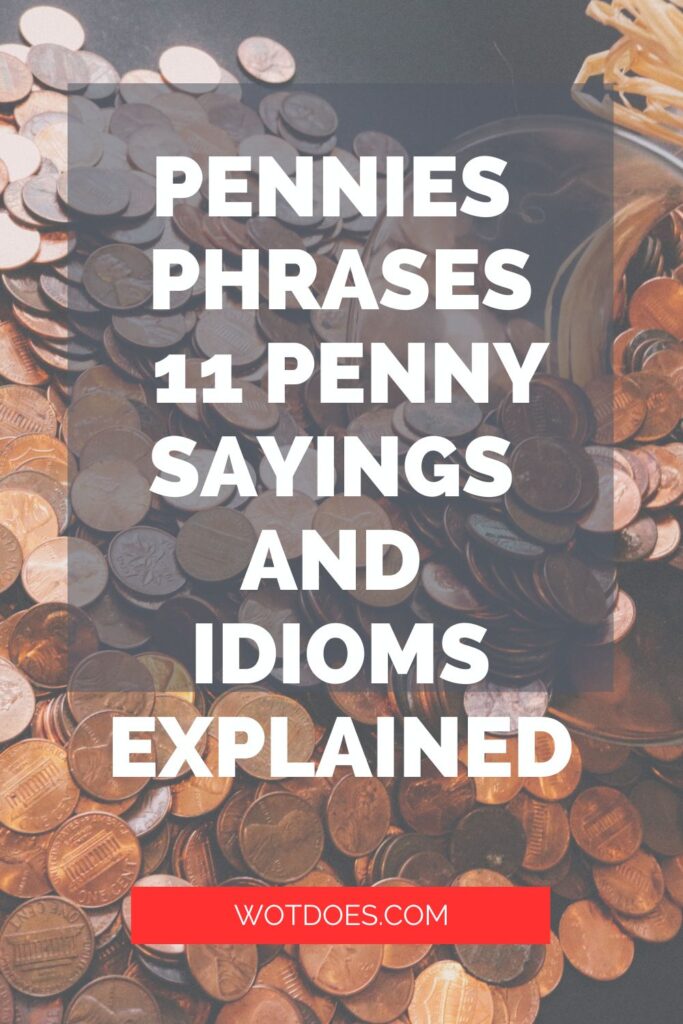Pennies might be small in value, but they hold significant cultural and linguistic weight in the English language. Through various phrases and idioms, pennies represent concepts ranging from frugality to unexpected luck. These phrases have become part of everyday life. Let’s explore and explain some Penny Phrases, Sayings and Idioms, their meanings, and their origins.

1. A Penny for Your Thoughts
The phrase a penny for your thoughts is used to ask someone what they are thinking about. When someone seems deep in thought, offering a penny is a way of expressing curiosity about their inner reflections. The idea is that their thoughts are worth something, even if it’s just a small amount. For example, “You seem lost in thought. A penny for your thoughts?”
2. A Penny Saved is a Penny Earned
A Penny Saved is a Penny Earned, which means saving money is just as important as earning it. This adage emphasises the importance of frugality. Each penny saved contributes to your overall wealth, much like earning a penny would. It’s a reminder that small savings can accumulate to significant amounts over time.
3. Pennies from Heaven
The saying Pennies from Heaven signifies an unexpected good fortune. This idiom suggests that receiving money or good luck out of the blue is like a gift from above. The phrase paints a picture of pennies falling from the sky, symbolising unexpected blessings.
4. Turn Up Like a Bad Penny
The saying, Turn or Turning Up Like a Bad Penny, refers to someone or something unwelcome that keeps appearing. Just as a bad penny seems to keep showing up despite efforts to get rid of it, this idiom describes an unwelcome person or situation that repeatedly resurfaces. For example, “I hope he doesn’t turn up like a bad penny at the party.”
5. Not Worth a Penny
The meaning, Not Worth a Penny, describes something that has very little or no value. This phrase is used to describe items or ideas that are considered worthless. It emphasises that even the smallest unit of currency is too much for something of no value. For example, “This old computer isn’t worth a penny.”
6.Penny-Wise and Pound-Foolish
The saying Penny-Wise and Pound-Foolish, is an idiom that warns against being overly frugal with small expenditures while being careless with larger ones. It highlights the importance of maintaining a balanced approach to spending and saving. For example, “By trying to save on heating, they had huge repair bills. Truly penny-wise and pound-foolish.”
7. In for a Penny, In for a Pound
The saying In for a Penny, In for a Pound, is about committing to something fully once you’ve started. Originating from British currency, this phrase suggests that once you’ve invested a small amount (a penny), you might as well invest more (a pound) and fully commit to the endeavour. For example, “We’ve already started the project. In for a penny, in for a pound.”
8. Spend a Penny
The term Spend a Penny is a euphemism for going to the toilet. This British expression dates back to when public toilets required a penny for entry. It’s a polite way of saying one needs to use the bathroom. For example, “Excuse me, I need to spend a penny.”
9. Pretty Penny
The saying Pretty Penny depicts something that costs a lot of money. When something is referred to as costing a “pretty penny,” it means it is quite expensive. The phrase implies that the item is valuable or costly. For example, “That new car must have cost you a pretty penny.”
10. Penny-Pincher
The saying Penny-Pincher describes someone who is very frugal or unwilling to spend money. A penny-pincher is someone who goes to great lengths to avoid spending money, sometimes to the point of being miserly. The term emphasises extreme frugality. For example, “She’s such a penny-pincher; she never offers to buy a drink.”
11. Penny Has Dropped
You use The Penny Has Dropped when someone finally understands something after a delay. This idiom refers to the moment of realisation when someone finally grasps an idea or concept. It’s akin to the moment when a coin falls and makes a sound, signalling that the mechanism is working. For example, “It took him a while, but the penny finally dropped, and he realised what she meant.”
Pennies Are An Important Part Of Language
Pennies, though small in monetary value, carry rich and varied meanings in the English language. These Penny Phrases and idioms reflect the cultural importance of even the tiniest units of currency, emphasising values like frugality, commitment, and unexpected fortune. Next time you come across a penny, remember that it’s not just spare change; it’s a token of linguistic and cultural wealth. Also, see Bird Phrases and Idioms. and see more about the history of the penny at the Royal Mint.
Leave a Reply